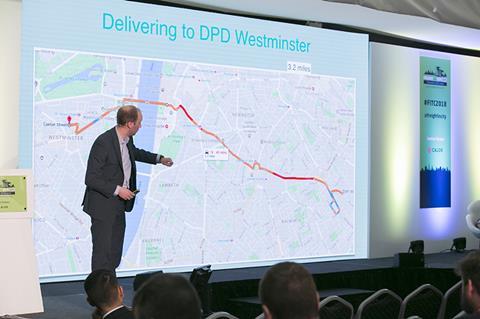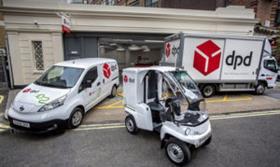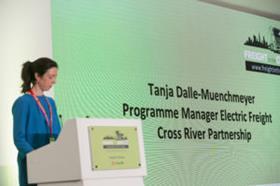
Both DPD UK and UPS (via Cross River Partnership) provided delegates at Freight in the City 2018 with more details on their respective electric-powered urban distribution operations in the capital.
DPD’s 5,000ft² Westminster site, which can handle 2,000 parcels per day and opened on 17 October, is part of the carrier’s “micro distribution strategy in London” said Rob Fowler, general manager, CSR and technical planning (main picture).
DPD currently operates 11 depots in London, primarily on the edge of the city and, Fowler said, that ultimately affects the number of vehicles it puts on the road. The Westminster operation allows for low stem mileage from a micro depot.

“We are paying a market rent for the property at 5,000ft2 and spent £500,000 fitting the building out for all electric. It will serve SW1 postcodes where some of our routes are less than five miles a day.
"We’ve purchased Nissan NV200s - well proven electric technology - and are the first company in the UK to import the Paxster: you can get 100 to 110 parcels a day on this vehicle.
“Every micro-depot is fed by a larger depot. We’ve procured two eCanters to do that. The other challenge is charging solutions. We have a 10-year lease on Westminster, we don’t own it, but we spent £50,000 on charging solutions. This keeps the lights on and vehicles charged!” he added.
Fowler said that Westminster was just the start of its micro distribution strategy and it could achieve “great productivity” in the centre of London, but only with a huge amount of investment and improvement.
“It is a high productivity situation,” he said of the micro distribution strategy. “It is considerably more expensive per square foot, but needs high utilisation per square foot making it very valuable to our business.”
However he said that the industry as a whole needed a mass produced electric 3.5-tonne OEM vehicle. “We need that manufacturer to come forward,” said Fowler. “We need the buildings, we need the electric infrastructure. We need to share the pain.”

Tanja Dalle-Muenchmeyer (pictured, left), programme manager, electric freight at the Cross River Partnership (a London-based public private partnership) has worked with UPS and UK Power Networks since 2013 on a 4.5-year project to improve the electrification of the UPS fleet in London.
“Local grid constraints can cause a real issue,” she said of the strains of the project. “Adding these vehicles means UPS have more EVs to charge than they can handle on the current electric infrastructure.”
One solution, she said, was smart-charging technology: “It works throughout the night deciding which vehicles get which power so UPS can now electrify its central London fleet of 150 vehicles.
"This optimises use of existing assets, but smart-charging reduces capital expenditure. It can also reduce operational expenditure. Smart-charging tech is developing rapidly and we have introduced smart charging to UPS and retained business continuity.”














